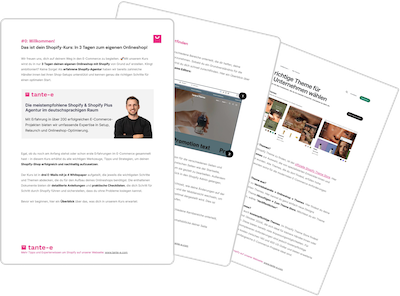Shopify is often still viewed as a commerce platform primarily suited to startups and growing e-commerce brands. However, developments in recent years have shown that more and more large and medium-sized companies are switching to Shopify to implement complex and powerful online shops.
In this article, we'll take a closer look at the opportunities and challenges of Shopify in the enterprise context. Using practical examples, you'll gain valuable insights that will help you assess whether Shopify is a good fit for your needs.
The content is based on our experience as an agency in over 200 different e-commerce projects, as well as on the episode of the Merchant Inspiration Podcast with Axel Rüweler from denksteich . In this podcast, he talks with Adrian about his experiences advising and supporting large and traditional companies with Shopify.

Our e-commerce expert Adrian has already helped numerous brands launch on Shopify. In his book, Shopify for Dummies, he provides retailers with all the essential information they need to navigate Shopify ( view on Amazon / view at your local bookstore ).
Get started on Shopify - with our guides & checklists 🚀
1. Is Shopify suitable for large companies?
Shopify is one of the world's leading e-commerce platforms: Over 4.8 million online shops around the globe speak for themselves. Thanks to various advantages such as ease of use, no-code approach, and flexible scalability, it has established itself as a popular platform for modern e-commerce brands.
But in recent years, Shopify has become a serious player in the enterprise segment, primarily thanks to Shopify Plus . More and more medium-sized and large companies, including Beurer, Universal Music, reisenthel, and HAKA, are relying on the flexible and scalable e-commerce solution. But is Shopify truly suitable for the complex requirements of traditional and large companies?
This question is controversial. Traditionally, many large companies rely on systems like Salesforce Commerce Cloud or SAP Commerce, which are tailored from the ground up to meet the needs of corporations. Shopify often struggles in the enterprise segment with being perceived as "too simple" or "not customized enough." These prejudices persist, but they are untrue.
Shopify offers high scalability, allowing even large companies with high sales volumes to use the platform seamlessly. Shopify also boasts a robust API and diverse integration options, significantly increasing the scope for flexible customization. Furthermore, large companies benefit from Shopify's proven and reliable checkout process, especially when dealing with high order volumes.
On the other hand, there are challenges: Shopify can be set up legally compliant for large and traditional companies, but careful review is advisable. Integrating Shopify into complex IT infrastructures can also prove complex and require thorough planning.
It's already clear: There's no one-size-fits-all answer to the question of whether Shopify is ideal for large companies. Rather, it depends on the specific shop features you need and the demands you place on the shop system.
Below, we'll go into detail about the individual benefits and potential limitations. So you can find out for yourself which points resonate with you and whether Shopify is a good choice for your business. We'll also share three examples of long-established companies that switched to Shopify.
2. Shopify for large companies: Advantages
1. Speed and efficiency
In our experience, a key advantage of Shopify is how quickly and efficiently e-commerce projects can be implemented. Large companies, which are often accustomed to complex and lengthy implementation processes, benefit from the rapid time to market.
Thanks to the SaaS (Software-as-a-Service) infrastructure, stores can be set up and launched relatively quickly. The online store is not hosted on the company's own servers but is provided by Shopify. Merchants can focus on their core business and expanding their store, instead of worrying about hosting, updates, and server maintenance.
2. Scalability without compromise
Shopify Plus, the enterprise version of Shopify, is designed to handle high transaction volumes and high traffic peaks. Even highly trafficked stores—such as Taylor Swift's store, operated by Universal Music—run stably and perform well. This means that even traditional companies and large online stores can grow with Shopify without worrying about performance bottlenecks.
Shopify provider comparison : Find out in our extensive comparison which shop system suits you best.
3. Integration into existing systems
Large companies often have an existing IT landscape that needs to harmonize seamlessly with the new e-commerce solution. Shopify offers comprehensive API documentation that facilitates integration with existing ERP, CRM, or OMS systems.
Middleware solutions with standard Shopify connectors can further simplify the process and ensure Shopify integrates seamlessly with existing infrastructure. This allows companies to maintain existing processes while leveraging Shopify's benefits.
4. Flexible adaptation and expansion
Shopify stands out for its extensive app ecosystem, which offers numerous extensions for specific business needs. From marketing automation with tools like Klaviyo to specialized integrations for payment processing or shipping solutions—the choices are virtually endless.
This modular approach makes Shopify particularly attractive for large companies that need flexibility and scalability without sacrificing customization.
Which Shopify apps do we recommend most?
5. Lower operating costs
Compared to traditional on-premises systems, Shopify's SaaS model is significantly more cost-effective. Maintenance tasks, server management, and regular updates are handled centrally by Shopify, reducing the burden on internal IT resources.
Unforeseen expenses, such as server outages, are also eliminated. Experience has shown that Shopify is a more budget-friendly solution, especially in long-term cost calculations, and offers an attractive price-performance ratio.
You can find out everything about Shopify’s costs in our blog.
6. Standardized, reliable checkout
Shopify's checkout is standardized and reliable. This minimizes the risk of system failures, especially compared to complex on-premise systems. With Shopify, large companies don't have to deal with error-prone solutions; instead, they can rely on a proven and stable checkout from the start.
7. Support from a broad network
With Shopify, you're not alone; you're part of a strong community. In addition to merchants on the platform, the number of specialized Shopify Plus agencies with in-depth experience in the enterprise segment is also growing. These agencies help not only with implementation but also with long-term optimization and expansion of your store.
Do you need help with your online store? As a leading Shopify and Shopify Plus agency, we're here to support you with our experience – from planning to implementation. Let's talk!
3. Shopify limitations for large companies
While Shopify offers numerous benefits, large companies with specific requirements can face challenges. We want to be transparent about these limitations so you can decide whether Shopify is a good fit for your use case or whether you'll have to make compromises.
1. Limited checkout customization
A key aspect in the enterprise sector is the checkout, which often needs to be customized to meet the individual needs of the customer. As already mentioned, Shopify pursues a standardized solution that guarantees stability and security, but limits the scope for customization.
For businesses that require special features such as dynamic discounts, complex address validations, or credit checks, Shopify Checkout isn't easily customizable. Even with Shopify Plus's Checkout Extensibility, the capabilities currently lag behind those of on-premise systems.
2. Challenges of system integration
Integrating Shopify into IT environments such as existing ERP, CRM, or OMS solutions can be time-consuming and costly, especially with older or proprietary systems. We therefore strongly advise traditional companies to ensure they have the necessary resources and work with experienced partners to successfully complete the integration.
3. Limitations in the authorization system
Shopify's permission system quickly reaches its limits with large teams or complex hierarchies. While basic permissions like access to orders or products are clearly defined, granular settings at the module level are lacking.
For example, users with access to the theme editor can make extensive changes to the store's design—potentially risking the integrity of the design. Organizations therefore often need to establish internal controls to prevent potential errors or misuse.
4. Data protection concerns
Data protection is a sensitive issue, especially for companies based in the EU. Shopify stores data on servers in the US, which can pose problems when complying with GDPR. Shopify can be set up legally compliantly and offers tools and contracts to ensure compliance. However, the primary responsibility lies with the companies.
Thus, the use of apps requires a clear governance strategy: traditional companies should establish guidelines for the selection and use of apps to avoid security issues and data protection risks.
4. Examples of traditional businesses on Shopify
Now that you've learned about the advantages and limitations of Shopify for large companies, let's take a look at some practical examples. reisenthel, HAKA, and LERROS are three long-established companies we successfully supported in their migration to Shopify. We'll give you insights into their experiences and show you how they combined their business models with a future-oriented infrastructure:
1. reisenthel

reisenthel, a brand that has stood for functional bags and thoughtful design for decades, has found a platform in Shopify that ideally supports its values and requirements.
With a tailor-made design that elegantly underlines the brand identity, the store clearly stands out from standard solutions. A visual mega menu for desktop and an intuitive two-level menu for mobile devices guarantee optimal navigation on all devices.
The shop also impresses on a functional level: Thanks to a complex inventory logic, different delivery dates for pre-orders can be clearly communicated. Additionally, the shop offers a flexible variant selection that allows products to be intuitively displayed in different colors and sizes.
Internationalization plays an important role for reisenthel. Using Shopify Translate & Adapt, we translated the store into six languages so that customers from different markets can be reached.
2. Men's clothing

The traditional brand HAKA, known for its skin- and environmentally friendly laundry and cleaning products, demonstrates how a unique business model can be seamlessly digitized with Shopify. The online store combines traditional direct sales with a modern e-commerce approach.
During our collaboration, we focused on the intelligent integration of direct sales. Customers can enter their HAKA partner's ID when registering or in the shopping cart, which is then saved in the backend. The partner assignment is automatically applied to future orders, simplifying the purchasing process for customers and making sales staff more efficient. Additionally, customized links can be created that forward discounts directly to the respective customers.
HAKA also relies on playful elements to enrich the shopping experience. Customers find thresholds in their shopping cart that unlock free gifts – tailored to the sales channel through which they order. This personalized gamification strengthens brand loyalty and provides additional incentives to purchase.
The optimized product pages offer maximum transparency: In addition to detailed information on ingredients and application, there are visual variations, cross-selling options, and customer reviews that strengthen trust in the products. Warning pop-ups on the category pages also provide information about potential hazards and usage warnings, thus ensuring safety and education during the purchasing process.
HAKA demonstrates how Shopify can meet the unique requirements of a specialized business model. The store not only simplifies shopping for customers, but also streamlines internal processes thanks to its user-friendliness.
3. LERROS

The traditional brand LERROS has made the leap into the modern e-commerce world by migrating from OXID to Shopify Plus. The old shop was maintenance-intensive and inflexible, requiring external support for every change. With Shopify Plus, LERROS was able to not only regain control of the shop but also streamline processes.
A new store design, supported by Xentral as the ERP system, offers optimized product presentation with high-resolution images and videos, as well as intuitive filtering options. We took care of the smooth migration of customer data to secure existing relationships. We also integrated the Shopify POS system to connect online and offline purchases.
The result: LERROS can manage its shop independently, respond more quickly to market demands, and present itself as a future-proof brand with a modern, flexible system.
You can find more reviews of Shopify stores like Hensslers Schnelle Nummer or Pinqponq in our blog.


